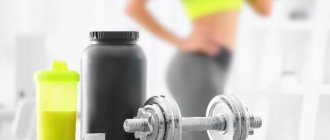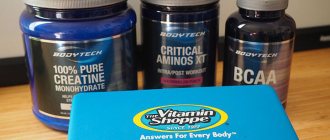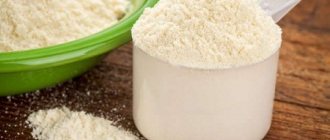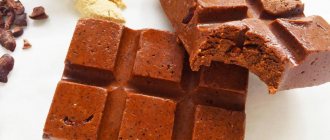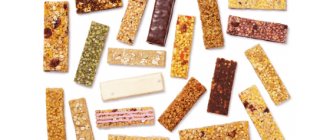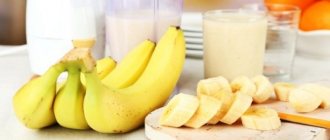Functions of protein during strength training. Features of protein intake on rest days. Professional athletes know from their own experience that it is almost impossible to achieve significant results in sports without taking special supplements. Moreover, today one of the main assistants of a bodybuilder is protein. This is not surprising, because protein is the basis for muscle growth. If it is absent or insufficient, significant success in sports, the acquisition of definition and an increase in muscle volume cannot be counted on. But how to drink protein correctly? Is it needed on rest days or should you only drink it on training days? Let's look at these questions in more detail.
Briefly about protein
For many beginners, having so many different types of protein is a revelation. Most people do not know about the existence of whey, soy, milk, casein and other types of protein. But this is a very important point. The type of protein directly determines the time of its intake, dosage and effect.
It is important to know that protein can be “fast” and “slow”:
- “Fast” proteins are characterized by a high rate of absorption by organisms. They have unique indicators of biological activity, so they are suitable for taking in the morning and after training. These supplements include all types of whey powder - isolates, concentrates and hydrolysates.
- “Slow” proteins are absorbed much longer - up to 6-8 hours, so it is better to drink them at night or during long breaks in nutrition. Their peculiarity is the continuous supply of muscle fibers with amino acids and the prevention of catabolic processes. Slow proteins include:
- soy protein takes a very long time to digest in the stomach (especially if you buy a low quality purified product). But despite this, this type of protein is in great demand among athletes. Taking it allows you to lower blood cholesterol and lose excess fat;
- Casein powder is also absorbed slowly, so drinking it is most effective before bed. Disadvantages include an unpleasant taste and poor solubility in water, which complicates the process of preparing a protein shake;
- egg protein, like casein, has a “long-lasting” effect and begins to act only after 4-6 hours.
So, we have mentioned the main types of proteins that are most in demand in bodybuilding today. All of them can be drunk on any day, regardless of the time of rest and training. But more on that below.
What's under the lid
In addition to the amino acid complex, the protein shake contains: vitamins A and C - 0.3 mg/100 g each and a number of microelements. Among others:
- 3 mg/100 g magnesium;
- calcium;
- silver;
- sulfur, potassium;
- sodium
Flavored drinks are usually offered at fitness centers. However, a homemade protein drink has a natural taste and also contains the necessary nutrients. Per 500 ml serving:
- proteins – about 40 g;
- carbohydrates 80g;
- fat – 30 g.
Energy value – 820-840 kcal/100.
Reception features
You need to drink protein wisely, otherwise you will throw money away, and tedious exercises will not bring the expected result. However, a lot depends on whether you take supplements on training days or rest days. Let's look at each option in more detail:
- Training days. So, the optimal dosage for an athlete who is actively involved in the gym is about 2-2.5 grams per kilo of weight. Therefore, if your scale shows 90 kilograms, then you need to drink about 200 grams of protein per day. Naturally, you can’t consume protein at once - it simply won’t be absorbed. The total dosage must be divided into 5-6 equal parts, each of which should contain no more than 30-40 grams of protein:
- after waking up. A serving of protein powder stops catabolism and provides the necessary supply of amino acids to starved muscles. The best option is whey protein, which is perfectly absorbed and after 30-40 minutes provides muscle fibers with a “package” of amino acids;
- between meals. Allows you to maintain the level of amino acids in the body at a consistently high level. Here it is advisable to take “fast” proteins, but during long periods without food you can also drink “slow” proteins (for example, the same casein);
- immediately before class. About an hour before training, you can take another portion of protein, which will improve the body's performance and increase its endurance. In this case, the muscle fibers will receive the necessary nutrition already during training, which will increase the effectiveness of training;
- after visiting the gym. An hour after classes, you can drink another portion of the supplement in order to close the “protein window” as quickly as possible. And here whey protein comes to the rescue again with its almost instant digestibility;
- for the night. Here, a portion of protein is necessary to stop the catabolism process and supply muscle fibers with amino acids during sleep. But fast proteins will be useless. The best option is casein or soy powder.
- Rest days. As practice shows, it is necessary to drink protein even on days off from training. The only thing is that the dosage in this case should be more loyal. For example, you can leave the morning dose untouched (it is mandatory), drink the second serving somewhere between 5-7 pm, and the third just before bed. The total portion on a rest day should be about half of the maximum portion (for example, if 200 grams of protein are needed on training days, then 80-100 will be enough on rest days).
If you want to save money, then on those days you can leave only the night portion of protein, and during the day lean on fish, cottage cheese, milk and eggs. Sometimes this option looks even more preferable.
Recipes
Several popular recipes are given below.
With fruits:
- Peel boiled eggs (5 pieces), separate the yolks.
- Peel banana, kiwi, cut.
- Place the ingredients in a blender, add 3 tablespoons of milk, 1 tablespoon of honey. Beat.
With honey and hazelnuts:
- Place a glass of fruit juice in a blender.
- Add low-fat cottage cheese (100 grams), honey, egg, 2 bananas, a handful of hazelnuts. Beat.
With ice cream:
- Mix ice cream with honey.
- Add cottage cheese, kefir, sunflower seeds. Beat.
With fruit juice:
- Mix cottage cheese (200 grams) with sour cream.
- Pour in fruit juice and sprinkle with almonds. Beat.
Recipe for men:
- Break 5 chicken eggs into hot water (2 cups), separating the yolks, cook over low heat, stir.
- Add ground pepper and salt.
- Grind into a homogeneous mass.
Be sure to read: Methane for muscles: side effects, how to take it correctly, dosage, how to combine it with training
Recipe for women:
- Mix 2 mashed yolks with powdered sugar (50 grams) and a pinch of vanillin.
- Heat milk (2 cups), pour in the yolks, stir.
- Beat the whites into a thick foam with powdered sugar (50 grams), place on the cocktail, add a teaspoon of cocoa powder on top.
Proper nutrition
A person who does not trust store-bought protein must understand that in order to grow muscles, it is necessary to consume a sufficient amount of protein. Depending on body parameters, the level of protein consumption is calculated individually for each person.
But per day this figure should not be less than 120 grams. The leaders in protein content are lean meat and chicken eggs. Plant foods should also be present in the daily diet.
How to measure protein doses with regular spoons
Most often, athletes use large cutlery - it is much more convenient. It is not recommended to store metal accessories inside the package, so it is better to keep it nearby or simply take out a new one.
One tablespoon, including a standard “hill”, contains approximately twenty-five grams of protein powder. If there is no slide, then the dose corresponds to 20 grams.
If we compare the resulting mass with the capabilities of a teaspoon, we can draw the following ratio: one tablespoon is equal to two teaspoons. Based on this, it is worth building a dosage for 200 milliliters of liquid. For greater convenience, it is better to get a measuring device - it is much more convenient than counting out numerous spoons going into a future cocktail.
How and how much protein should you take per day?
How to take protein? Agree, such a question either did not arise in your mind, or for a moment it emerged from your subconscious and immediately hid back, satisfied with the excuse: “It’s all written on the package.” Firstly, it is not written, and secondly, it is impossible to achieve high results without following the dosage regimen, even if the best brand of sports nutrition was chosen. It’s like in the situation with medications: you didn’t take the dose enough and it didn’t help, you took too much and it became bad, you missed a dose and you erased previous achievements. Therefore, today we will look in detail at how to drink protein correctly, and also share tips on turning the monotonous process of preparing a bland protein shake into a tasty and enjoyable ceremony.
The role of protein in the body
Proteins are the main “building material” for our body. “They play the role of “bricks” that make up almost everything: internal organs, muscles, hair, nails, skin, brain,” explains Yesenia Kalyuzhina, a rehabilitation specialist at the SportMedica sports medicine clinic .
Proteins are also involved in important processes occurring in the body. Protein is responsible for:
- Immunity. “Antibodies that protect the body from infections are proteins,” adds Yesenia Kalyuzhina.
- Energy. “One gram of protein “gives” 4 kcal, but they are used when carbohydrate reserves are depleted,” says Yesenia Kalyuzhina.
- Transportation of substances. “Hemoglobin is also a protein,” reminds Yesenia Kalyuzhina.
- Metabolism, hormonal and nervous regulation.
The daily protein intake for adults is not that high. “For a healthy adult, it is 0.8-1.5 g per kg of weight,” explains Anna Korobkina, nutritionist, nephrologist at the Israeli Hadassah Hospital . — If your job does not involve physical activity, you need only 1 g of protein per 1 kg of body weight per day. For intense training (severe physical activity) - up to 1.5 g of protein per 1 kg of weight. For kidney disease, the dose should be reduced to 0.8 g/kg. I consider consumption of more than 2 g of protein per 1 kg of body weight per day nephrotoxic.”
It's all about pure protein. If we talk about products, a girl who does not exercise and weighs about 60 kg will receive her daily nutrient intake from 200 g of turkey and 100 g of cottage cheese.
DIY protein shakes made from natural products
Recipe No. 12
A protein shake after a workout will immediately restore glycogen stores:
- half a liter of 1% kefir;
- 180 g curd mass;
- 2 bananas;
- 200 ice cream;
- 100 ml concentrated cocoa drink.
Recipe No. 13
- A spoonful of sprouted wheat is combined with flax oil;
- 230 cottage cheese and beat;
- the thick mass is diluted with fermented baked milk.
Recipe No. 14
To prepare natural protein you will need:
- Grovo melange – 50 ml;
- a couple of tablespoons of powdered milk;
- banana;
- spoon of gelatin granules;
- honey.
Recipe No. 15
It is important for athletes to maintain protein intake. You can make a natural drink at home using the following recipe:
- 50 g grated walnuts;
- 40 ml syrup;
- 200 ml yogurt.
Recipe No. 16. Drink from Steve Reeves
- 3 village eggs;
- 20 g milk powder;
- banana;
- 12 g gelatin, maple syrup or honey.
What is whey protein?
Like other supplements, this popular remedy is of natural origin, namely animal. As the name implies, the powder is obtained from whey. It, in turn, is a by-product of cheese production. Some time ago, manufacturers did not know its value, but now the issue has been well studied. The watery part of milk, which is whey, contains easily digestible amino acids, lactose, a full range of B vitamins, calcium and other beneficial substances. In fact, it absorbs all the best that is in dairy products. The composition of the protein is close to that contained in human milk. It's hard to imagine something more healthy and nutritious.
Side effects of protein shakes
What “chemistry” is this sports nutrition made from? Does it have any side effects?
In general, not from chemistry, but from natural products - protein is isolated and standardized according to its amino acid content. What protein is obtained from is always indicated on the packaging. Egg and whey proteins are considered the best in terms of absorption and effect, while milk (casein) is slightly worse. Vegetable (mainly soy) always raises questions about the use of GMOs, but is suitable for vegetarians.
I want to warn you right away: casein protein is not powdered milk, and egg protein is not powdered eggs! This is not just a crushed and dried product: excess carbohydrates, fat, impurities are removed from it, amino acids and vitamins are strictly dosed, substances are added that help muscles recover after training (creatine, inosine, chromium picolinate) or burn fat (L-carnitine). You can compare this with pharmaceutical production: it is one thing to drink green tea, another thing is to take antioxidants isolated from it in tablets.
As for side effects, of course, there is a risk of allergic reactions, as with any product, and individual intolerance, which can manifest as diarrhea. If you have gastrointestinal diseases, you should consult a doctor before taking it.
What to look for when choosing sports protein shakes?
There are two types. High-carbohydrate protein powder (gainer) is designed for dramatic muscle gain. And if you are planning to lose weight, then it will not suit you. It is easy to recognize: the label always contains the words Mega Gainer, Mass Weight, Mega Mass, Muscle Gainer. One serving (from 20 to 100 g of powder) of gainer contains 500-800 kcal. They are taken only against the backdrop of powerful strength training with heavy weights, when the body needs a lot of energy and explosive muscle growth. Alas, at the same time, athletes always gain fat, which is then lost during the “drying” period.
The second option - pure protein mixtures - was originally developed just for this training cycle. The calorie content of a serving is about 100 kcal, and it is almost pure protein with a minimum of carbohydrates necessary for its absorption. This option is more suitable for fitness enthusiasts and ordinary people.
It is more profitable to buy a protein shake not in an already diluted form in fitness clubs, but in powder form at a sports nutrition store. The dosage is very simple: a measuring spoon or glass is always included in the kit, this is one serving. The amount and type of liquid to stir in is also indicated on the label. And keep in mind that the mixture is quickly absorbed, so the feeling of hunger sets in an order of magnitude faster than after soup or a hot dish.
What kind of supplement is this?
Let's remember what a gainer consists of. Roughly speaking, it is based on only two components - proteins (egg, milk, whey or soy) and carbohydrates (most often represented by maltodextrin). The purpose of the product is to replenish the body with all the necessary vitamins, microelements, and, of course, proteins.
By taking a gainer during the day, before and after training, you can achieve excellent results:
- finally, it’s good to work out every muscle of the body and literally “carve” the desired relief;
- increase muscle mass and weight (if there were problems with this);
- forget what fatigue is after a workout. Gainer quickly and effectively restores muscle fibers;
- protect muscles from catabolic processes (and the effect of the supplement, when taken correctly, is felt throughout the day);
- increase the duration of the workout. Thanks to the carbohydrate-protein mixture, the body's endurance significantly increases;
- strengthen your immunity. For an athlete who is actively involved in sports, this is very important. Gainer is the best way to maintain sports health.
So, the benefits of a carbohydrate-protein mixture are obvious. It remains to be found out when it is better to drink a gainer - in the morning, in the evening, after training or before starting classes.
Why should you drink a gainer before training?
Before exhausting physical activity, the gainer will become an indispensable assistant for your body. By drinking a portion before training (1-1.5 hours), you will receive a significant reserve of energy, which will increase the intensity of your workout. Proteins and carbohydrates will “fuel” the body throughout the entire exercise routine.
After a workout is also an effective time to take a cocktail. Protein will help restore damaged muscle fibers, and carbohydrates will replenish depleted energy reserves.
